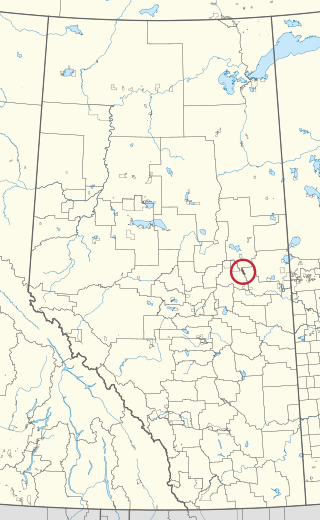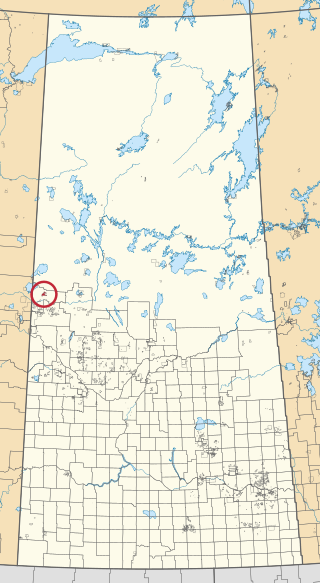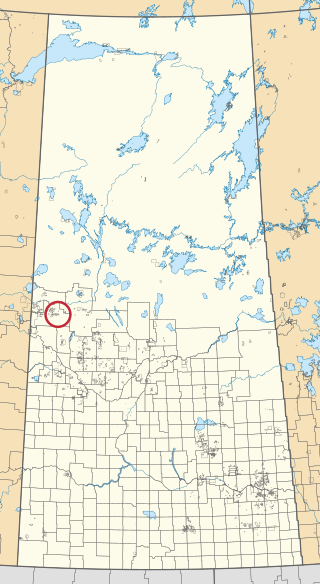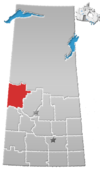The Battle of Loon Lake, also known as the Battle of Steele Narrows, concluded the North-West Rebellion on June 3, 1885, and was the last battle fought on Canadian soil. It was fought in what was then the District of Saskatchewan of the North-West Territories, at what is now known as Steele Narrows at Makwa Lake, in Saskatchewan's Steele Narrows Provincial Park. Steele Narrows is a channel that separates Sanderson Bay from Makwa Lake.

Loon Lake is a village in the Canadian province of Saskatchewan within the Rural Municipality of Loon Lake No. 561 and Census Division No. 17. The Makwa Sahgaiehcan First Nation reserve is to the east of the village. The village is located on Highway 26 north-east of the city of Lloydminster.

Division No. 17 is one of eighteen census divisions in the province of Saskatchewan, Canada, as defined by Statistics Canada. It is located in the west-northwest part of the province, bordering Alberta. The most populous community in this division is the interprovincial city of Lloydminster. Another important population centre is the town of Meadow Lake.
Makwa is a village in the Canadian province of Saskatchewan within the Rural Municipality of Loon Lake No. 561 and Census Division No. 17.
Makwa Sahgaiehcan is a Cree First Nation band government in Loon Lake, Saskatchewan, Canada. Their reserve is northeast of Lloydminster. The English translation of "Makwa Sahgaiehcan" is from Plains Cree language ᒫᑿ ᓵᑲᐦᐃᑲᐣ, mâkwa sâkahikan, meaning "loon lake". It is also the administrative headquarters of the Eagles Lake band government.
Barthel is an unincorporated community in northern Saskatchewan, Canada. It is a populated locality, an area similar to a locality but with a small group of dwellings or other buildings.
Fowler Lake is a lake in the Canadian province of Saskatchewan. The lake is in the RM of Loon Lake No. 561, west of Makwa Lake and Makwa Lake Provincial Park. West of and upstream of Fowler Lake is Murphy Lake, which is separated by an isthmus and connected by a short stream. Fowler Lake's outflow is at the eastern end and it flows eastward meandering through forest and muskeg before emptying into Makwa Lake. Access to the lake and its amenities is from Highway 699.

Whitefish Lake 128 is an Indian reserve of the Saddle Lake Cree Nation in Alberta, located between Smoky Lake County and the County of St. Paul No. 19. It is 68 kilometres west of Bonnyville. In the 2016 Canadian Census, it recorded a population of 1310 living in 291 of its 319 total private dwellings.
The Loon River First Nation is a First Nations band government in northern Alberta. A signatory to Treaty 8, it controls three Indian reserves, Loon Lake 235, Loon Prairie 237, and Swampy Lake 236.

Big Island Lake Cree Territory is an Indian reserve of the Big Island Lake Cree Nation in Saskatchewan. It is 39 kilometres east of Cold Lake, Alberta. In the 2016 Canadian Census, it recorded a population of 808 living in 132 of its 165 total private dwellings. In the same year, its Community Well-Being index was calculated at 37 of 100, compared to 58.4 for the average First Nations community and 77.5 for the average non-Indigenous community.

Makwa Lake 129 is an Indian reserve of the Makwa Sahgaiehcan First Nation in Saskatchewan. It is 151 kilometres northwest of North Battleford. In the 2016 Canadian Census, it recorded a population of 15 living in 5 of its 5 total private dwellings.

Makwa Lake 129B is an Indian reserve of the Makwa Sahgaiehcan First Nation in Saskatchewan. It is 95 miles northwest of North Battleford. In the 2016 Canadian Census, it recorded a population of 982 living in 226 of its 444 total private dwellings. In the same year, its Community Well-Being index was calculated at 47 of 100, compared to 58.4 for the average First Nations community and 77.5 for the average non-Indigenous community.

Makwa Lake 129C is an Indian reserve of the Makwa Sahgaiehcan First Nation in Saskatchewan. It is 95 miles northwest of North Battleford. In the 2016 Canadian Census, it recorded a population of 10 living in 4 of its 5 total private dwellings.

Ministikwan 161 is an Indian reserve of the Ministikwan Lake Cree Nation in Saskatchewan. It is 161 kilometres northwest of North Battleford. In the 2016 Canadian Census, it recorded a population of 624 living in 128 of its 150 total private dwellings. In the same year, its Community Well-Being index was calculated at 38 of 100, compared to 58.4 for the average First Nations community and 77.5 for the average non-Indigenous community.

Ministikwan 161A is an Indian reserve of the Ministikwan Lake Cree Nation in Saskatchewan. It is 177 kilometres northwest of North Battleford. In the 2016 Canadian Census, it recorded a population of 223 living in 40 of its 42 total private dwellings. In the same year, its Community Well-Being index was calculated at 35 of 100, compared to 58.4 for the average First Nations community and 77.5 for the average non-Indigenous community.

Onion Lake 119-1 is an Indian reserve of the Onion Lake Cree Nation in Saskatchewan. In the 2016 Canadian Census, it recorded a population of 0 living in 0 of its 0 total private dwellings.
Makwa Lake, which is Cree for Loon Lake, is a lake in the west-central region of the Canadian province of Saskatchewan in the transition zone between parkland and boreal forest. The Battle of Loon Lake, which was last battle of the North-West Rebellion, happened at Steele Narrows, a strait at the entrance to Sanderson Bay on Makwa Lake. The site is now part of Steele Narrows Provincial Park.

Makwa River is a river in the Canadian province of Saskatchewan in the transition zone between parkland and boreal forest. Makwa is Cree for Loon. The upper reaches of the Makwa River's watershed reach just across the border into Alberta and includes lakes such as Hewett, Ministikwan, Makwa, and Jumbo.
Jumbo Lake is a lake in the Canadian province of Saskatchewan in the transition zone between parkland and boreal forest. It is also known as Big Jumbo Lake to differentiate it from adjoining Little Jumbo Lake. Big and Little Jumbo Lakes make up the heart of Makwa Lake Provincial Park and are part of several inter-connected lakes that include Makwa Lake and Upper Makwa Lake. The southern half of the lake is within Makwa Lake Provincial Park and the northern half is within Makwa Lake 129B Indian reserve. Access to both lakes is from Highway 699.












